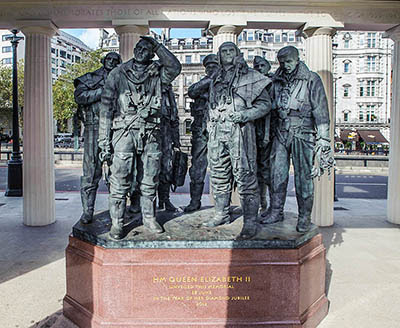April 9, 1945 - The Youngest Guinea Pig
After five days at the RAF Hospital in Halton, Douglas Hicks received his travel orders and on April 9th, was again on the move by train and bus, this time to the Canadian Wing of the Queen Victoria Hospital in East Grinstead, England for the treatment of burns he sustained during the Dessau raid. At nineteen years of age, Hicks was to become the youngest member of the Guinea Pig Club, the club for burned Allied airmen.
Hicks described his awkward journey to East Grinstead:
With new orders I am now on the way to a hospital south of London. I ride the bus to the railway station at Kings Cross. I must now work my way to the other side of London to catch a train to East Grinstead. East Grinstead is south of London, the location of the Queen Victoria Hospital. This hospital specializes in the treatment of burned military personnel.
My dress should arouse suspicion not only from any [military police] but from any of the civilians that I might encounter. But it does not. My uniform now consists of a blue battle dress jacket with my air gunners wing and sergeant stripes, my shirt is khaki in color and is U.S. Army issue, my boots, also U.S. Army issue, are the brown boots worn by the paratroopers, of course let’s not forget my head, because of my burns I am still wearing the white paper bandage as applied by the German hospital staff. It is now looking very grubby. If was decided at the RAF station [Halton] that it should stay in place until I am able to get further hospital attention at my destination, finally my hair, it desperately need not only washing but a good combing.
On arrival, one of Hicks’ first requests was for a hot bath. After a superficial check by Dr. Tilley, it was determined no immediate treatment would be necessary for his burns.
Hicks’ next order of business catch up on letters. The first would be a short note to his mother but another would be far more difficult to write. Writing to the mother of the mid-upper air gunner Eric Robinson, one of the three killed on the raid to Dessau, Hicks remembered: “I apologized for being a survivor, and although the letter was very short I did attempt to convey sympathies which would run with and play with my mind for a long time.”
Hicks described his awkward journey to East Grinstead:
With new orders I am now on the way to a hospital south of London. I ride the bus to the railway station at Kings Cross. I must now work my way to the other side of London to catch a train to East Grinstead. East Grinstead is south of London, the location of the Queen Victoria Hospital. This hospital specializes in the treatment of burned military personnel.
My dress should arouse suspicion not only from any [military police] but from any of the civilians that I might encounter. But it does not. My uniform now consists of a blue battle dress jacket with my air gunners wing and sergeant stripes, my shirt is khaki in color and is U.S. Army issue, my boots, also U.S. Army issue, are the brown boots worn by the paratroopers, of course let’s not forget my head, because of my burns I am still wearing the white paper bandage as applied by the German hospital staff. It is now looking very grubby. If was decided at the RAF station [Halton] that it should stay in place until I am able to get further hospital attention at my destination, finally my hair, it desperately need not only washing but a good combing.
On arrival, one of Hicks’ first requests was for a hot bath. After a superficial check by Dr. Tilley, it was determined no immediate treatment would be necessary for his burns.
Hicks’ next order of business catch up on letters. The first would be a short note to his mother but another would be far more difficult to write. Writing to the mother of the mid-upper air gunner Eric Robinson, one of the three killed on the raid to Dessau, Hicks remembered: “I apologized for being a survivor, and although the letter was very short I did attempt to convey sympathies which would run with and play with my mind for a long time.”

Comments
Post a Comment